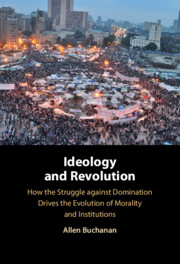Refine search
Actions for selected content:
33 results
Concurrent infections by Bonamia species (Haplosporidia) do not cause more intense infections
-
- Journal:
- Parasitology , First View
- Published online by Cambridge University Press:
- 30 October 2025, pp. 1-8
-
- Article
-
- You have access
- Open access
- HTML
- Export citation
Bringing back friction: Reflections on a humanistic culture of AI interdisciplinarity
- Part of
-
- Journal:
- Cambridge Forum on AI: Culture and Society / Volume 1 / 2025
- Published online by Cambridge University Press:
- 23 October 2025, e4
-
- Article
-
- You have access
- Open access
- HTML
- Export citation

Ideology and Revolution
- How the Struggle against Domination Drives the Evolution of Morality and Institutions
-
- Published online:
- 13 March 2025
- Print publication:
- 20 March 2025
13 - Life Sciences and Social Sciences
- from Part III (A) - Differentiation and Continuous (Trans)Formation
-
- Book:
- Systems, Relations, and the Structures of International Societies
- Published online:
- 19 October 2023
- Print publication:
- 02 November 2023, pp 223-244
-
- Chapter
- Export citation
From framework to theory: an evolutionary view of dynamic capabilities and their microfoundations
-
- Journal:
- Journal of Management & Organization / Volume 28 / Issue 3 / May 2022
- Published online by Cambridge University Press:
- 07 June 2022, pp. 429-450
-
- Article
- Export citation
Abstracting and formalising the design co-evolution model
-
- Journal:
- Design Science / Volume 8 / 2022
- Published online by Cambridge University Press:
- 25 April 2022, e14
-
- Article
-
- You have access
- Open access
- HTML
- Export citation
The Voices of European Law: Legislators, Judges and Law Professors
-
- Journal:
- German Law Journal / Volume 22 / Issue 6 / September 2021
- Published online by Cambridge University Press:
- 15 September 2021, pp. 956-982
-
- Article
-
- You have access
- Open access
- HTML
- Export citation
DESIGNING IN COMPLEXITY: HOW SOLUTION CONJECTURES INFORM PROBLEM EXPLORATION
-
- Journal:
- Proceedings of the Design Society / Volume 1 / August 2021
- Published online by Cambridge University Press:
- 27 July 2021, pp. 1153-1162
-
- Article
-
- You have access
- Open access
- Export citation
Reframing the Design Process: Integrating Goals, Methods and Manifestation into the Co-Evolution Model
- Part of
-
- Journal:
- Proceedings of the Design Society: International Conference on Engineering Design / Volume 1 / Issue 1 / July 2019
- Published online by Cambridge University Press:
- 26 July 2019, pp. 359-368
- Print publication:
- July 2019
-
- Article
-
- You have access
- Open access
- Export citation
Unveiling patterns of genetic variation in parasite–host associations: an example with pinworms and Neotropical primates
-
- Journal:
- Parasitology / Volume 146 / Issue 3 / March 2019
- Published online by Cambridge University Press:
- 16 October 2018, pp. 356-362
-
- Article
- Export citation
Reduced plant fitness by pre-dispersal seed predation in the threatened plant species Cirsium decussatum
-
- Journal:
- Seed Science Research / Volume 28 / Issue 2 / June 2018
- Published online by Cambridge University Press:
- 11 May 2018, pp. 123-130
-
- Article
- Export citation
Endoparasitic Paradiplectanotrema klimpeli sp. nov. (Monogenea: Ancyrocephalidae) from the Greater Lizardfish Saurida tumbil (Teleostei: Synodontidae) in Indonesia
-
- Journal:
- Parasitology Open / Volume 4 / 2018
- Published online by Cambridge University Press:
- 18 April 2018, e13
- Print publication:
- 2018
-
- Article
-
- You have access
- Open access
- HTML
- Export citation
The diversity and evolution of nematodes (Pharyngodonidae) infecting New Zealand lizards
-
- Journal:
- Parasitology / Volume 144 / Issue 5 / April 2017
- Published online by Cambridge University Press:
- 15 December 2016, pp. 680-691
-
- Article
- Export citation
The unity, diversity and conformity of bugs (Hemiptera) through time
-
- Journal:
- Earth and Environmental Science Transactions of The Royal Society of Edinburgh / Volume 107 / Issue 2-3 / June 2016
- Published online by Cambridge University Press:
- 18 January 2018, pp. 109-128
- Print publication:
- June 2016
-
- Article
- Export citation
Context, Comparison, and Methodology in Chinese Management Research
-
- Journal:
- Management and Organization Review / Volume 5 / Issue 1 / March 2009
- Published online by Cambridge University Press:
- 02 February 2015, pp. 57-73
-
- Article
- Export citation
Framing China: Transformation and Institutional Change through Co-evolution
-
- Journal:
- Management and Organization Review / Volume 4 / Issue 1 / March 2008
- Published online by Cambridge University Press:
- 02 February 2015, pp. 81-108
-
- Article
- Export citation
A co-evolutionary arms race: trypanosomes shaping the human genome,humans shaping the trypanosome genome
-
- Journal:
- Parasitology / Volume 142 / Issue S1 / February 2015
- Published online by Cambridge University Press:
- 26 June 2014, pp. S108-S119
-
- Article
-
- You have access
- Open access
- HTML
- Export citation
Les processus de néolithisation : socialiser la nature et naturaliser la société
-
- Journal:
- European Journal of Sociology / Archives Européennes de Sociologie / Volume 54 / Issue 2 / August 2013
- Published online by Cambridge University Press:
- 18 October 2013, pp. 157-185
-
- Article
- Export citation
Howling About Trophic Cascades
-
- Journal:
- Australian Journal of Environmental Education / Volume 28 / Issue 1 / July 2012
- Published online by Cambridge University Press:
- 04 October 2012, pp. 17-26
-
- Article
- Export citation
